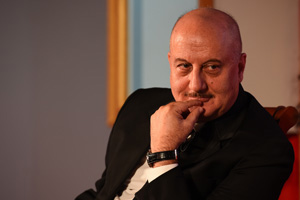New Delhi, Feb 2: Pakistan on Tuesday denied a visa to actor and BJP sympathiser Anupam Kher, who has been invited by the organisers of a literary festival in Karachi as one of their guests.
 Kher claims only he has been singled out of the 18 delegates who applied for the visa. "I am very sad and disappointed that out of 18 participants, 17 were given visa and I was denied," Kher told news agency ANI.
Kher claims only he has been singled out of the 18 delegates who applied for the visa. "I am very sad and disappointed that out of 18 participants, 17 were given visa and I was denied," Kher told news agency ANI.
The Pakistani High Commission, however, is reported to have said that Kher's visa is still under review. Other reports also quoted the Pakistani authorities as claiming Kher never applied for the visa in the first place.
Kher is scheduled to attend a session at the Karachi literary festival on February 5. The 60-year-old actor, who was awarded the Padma Bhushan recently, has been a vocal supporter of the BJP-led government at the Centre.
Last weekend, Kher and Congress leader Shashi Tharoor were involved in a war of words on Twitter over the veteran actor's comment that he is scared to openly say he is a Hindu.
Posting a link of Kher's recent TV interview, Tharoor tweeted, "Come on Anupam. I say it all the time. I'm a proud Hindu. Just not the Sangh's kind of Hindu. @AnupamPkher."
This did not go down well with the 60-year-old actor, who called Tharoor a "Congi Chamcha" (Congress stooge). "Come on Shashi. Never thought you will misinterpret my statement like trolls do. And behave like a Congi Chamcha."
Tharoor quickly retorted saying, "Abuse, @AnupamPkher , is what you use when you run out of arguments. I'm a proud MP of @INCIndia &I don't resort to insults. #CongiChamcha."
At the Jaipur literary festival held last month, the Bollywood actor had also sparred with Delhi minister Kapil Mishra over the limits imposed on freedom of speech and were joined in by a politically divided audience at the Jaipur Literature Festival (JLF).
Speaking against the motion at a session entitled 'Should Freedom of Speech be Absolute?' Kher alleged that a perception of intolerance was being created at festivals like the JLF, adding that there should not be an impression that people in the country are living in fear.




Comments
I discovered your blog site on google and
examine a number of your early articles. Always maintain up the very good function.
I simply extra up your RSS feed. Seeking forward to studying more from you
down the road!
Have a look at my page - deck heroes hack ios (Elvia: http://Realhacks24.com/deck-heroes-hack/)
i think he said i am a hindu
No need to apply for visa just say about intolerance in India. Chaddis will send you to Pakistan with out Visa!!!
why because you are a number one Modi chamcha and RSS chela...
Dear Friends,
I feel little fishy here.This is may be one more drama to stop paki artist to enter in indian film industry.....? Possibilities are there b'coz Anupam kher also belongs to cheddi gang.
Jai hind jai karnataka...
BETTER U GO TO NEPAL ......
EVERYDAY U BLAME PAKISTAN IN FRONT OF MEDIA NOW U NEED VISA HEHEH .. GO TO HELL
Being a Hindu you cant say you are Hindu, what is the guarantee when you go to Pakistan , you will say I am not a Indian.
Better you stay where you are.
Better you stay here with the Chaddi Friends. ! You are fit for that ! don't go anywhere .
Tharoor -- Very good RESPONSE to cheddi anupam... who lives exactly on the orders of Cheddi.
not pakisthan ,, go to hell
Add new comment